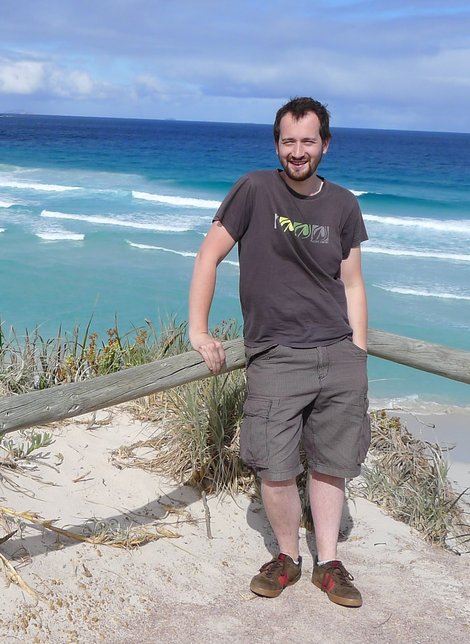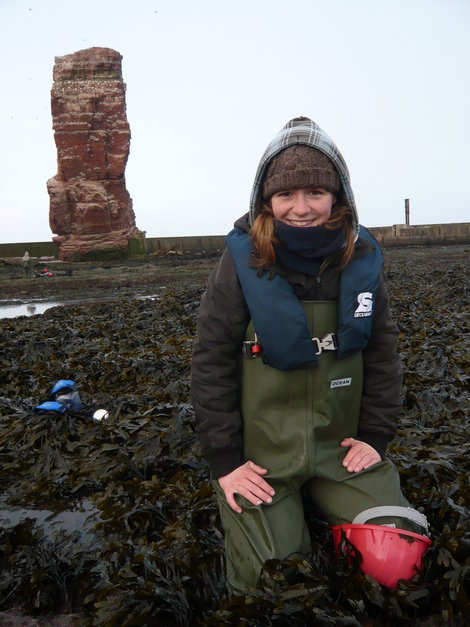Die Inhalte dieser Seite sind leider nicht auf Deutsch verfügbar.
Seitenpfad:
- Startseite
- ...
- INTERCOAST
- Latest News
- Archiv
- News 2013
- Phase II of the INTERCOAST Research Programme Has Begun With 13 New PhD Students On The University Of Bremen Side
INTERCOAST
Phase II of the INTERCOAST Research Programme Has Begun With 13 New PhD Students On The University Of Bremen Side
Phase II of the INTERCOAST research programme commenced on December 1, 2012 with the addition of two new PhD students: Brice Blossier (project IC1) and Merle Bollen (project IC7). We’re excited to welcome them to the team and look forward to following their successes throughout their PhDs. The INTERCOAST team conducted an interview to learn a bit more about these two new members. Read on to find out what they’re all about!
ICteam: Tell us a little bit about your background. (Where are you from? Where did you study?)
Brice: I am from the northwest of France (Le Mans). After I completed my Master of Science degree in Engineering in Paris, I moved to the Netherlands and graduated in Hydraulic Engineering at the Delft University of Technology. My primary objective there was to study the design of hydraulic structures (e.g., dams, dykes, and sluices), but I rapidly became much more interested in coastal hydrodynamics and morphodynamics.
Merle: I come from a small village in the vicinity of Oldenburg in Germany. I did my Bachelor studies in Biology and Physics at the University of Bremen and later completed the Master program in “Marine Biodiversity and Conservation”.
ICteam: What is your previous research/work experience and how do you think it has prepared you for the research topic you are now embarking on in the INTERCOAST program?
Brice: I did my main research work during my master thesis. Sand beaches often exhibit nearshore sandbars parallel to the shoreline. They are highly dynamic and show diverse profiles from straight to 3D-shaped with shoals and rip channels. My work was focused on the processes responsible for the straightening of a nearshore sandbar during a storm event. For that, I studied field data and used them to set-up a numerical model of the straightening event. Therefore, I got some experience about the ability of a numerical approach to improve the understanding of natural processes and I would like to apply it in my INTERCOAST project.
Merle: The research for my bachelor and master theses mainly concentrated on ecological marine aspects. I investigated biodiversity patterns along the shore of Helgoland and the feeding behaviour of an Arctic chaetognath species. Additionally, I had the pleasure to learn about sporulation in seaweeds during a research assistantship on Spitsbergen. In the course of my studies, I got very interested in the different life stages of marine algae and I would like to include life-history aspects into my INTERCOAST project.
ICteam: Tell us a little bit about your background. (Where are you from? Where did you study?)
Brice: I am from the northwest of France (Le Mans). After I completed my Master of Science degree in Engineering in Paris, I moved to the Netherlands and graduated in Hydraulic Engineering at the Delft University of Technology. My primary objective there was to study the design of hydraulic structures (e.g., dams, dykes, and sluices), but I rapidly became much more interested in coastal hydrodynamics and morphodynamics.
Merle: I come from a small village in the vicinity of Oldenburg in Germany. I did my Bachelor studies in Biology and Physics at the University of Bremen and later completed the Master program in “Marine Biodiversity and Conservation”.
ICteam: What is your previous research/work experience and how do you think it has prepared you for the research topic you are now embarking on in the INTERCOAST program?
Brice: I did my main research work during my master thesis. Sand beaches often exhibit nearshore sandbars parallel to the shoreline. They are highly dynamic and show diverse profiles from straight to 3D-shaped with shoals and rip channels. My work was focused on the processes responsible for the straightening of a nearshore sandbar during a storm event. For that, I studied field data and used them to set-up a numerical model of the straightening event. Therefore, I got some experience about the ability of a numerical approach to improve the understanding of natural processes and I would like to apply it in my INTERCOAST project.
Merle: The research for my bachelor and master theses mainly concentrated on ecological marine aspects. I investigated biodiversity patterns along the shore of Helgoland and the feeding behaviour of an Arctic chaetognath species. Additionally, I had the pleasure to learn about sporulation in seaweeds during a research assistantship on Spitsbergen. In the course of my studies, I got very interested in the different life stages of marine algae and I would like to include life-history aspects into my INTERCOAST project.
ICteam: What was particularly interesting about INTERCOAST that made you apply for the PhD scholarship?
Brice: As I was giving a presentation of my master thesis at the International Conference on Coastal Engineering 2012 in Santander (Spain), I met Christopher Daly who was presenting a field campaign performed at Tairua Beach (New Zealand) during his INTERCOAST PhD. He explained the details of the IC1 project to me and I got immediately interested by the field sites, especially in New Zealand where Tairua Beach exhibits a nearshore sandbar and morphological features called beach cusps.
Merle: I find my INTERCOAST-project to be especially interesting as it concentrates on an invasive seaweed species. The invasiveness of species is a current important environmental problem and fundamental research is necessary in order to understand and control further spread of invasive species. The possibility to conduct the studies in different locations is a great chance to reveal more general mechanisms of species expansions. As I have never been to New Zealand before, I am very excited to explore the marine coastal habitats there and to see the associated floral and faunal species.
ICteam: Do you have any experience working in an interdisciplinary environment?...How do you think the interdisciplinary opportunities can benefit your research and are there any projects in particular that you see a possibility for collaboration?
Brice: I did my master thesis at Deltares (Delft, The Netherlands), an institute where research is performed and applied in water related projects (coastal and river projects, groundwater resources, water quality, nature conservation). My own work was not really interdisciplinary, but I really learned how large scale projects require diverse expert skills, often combining science in multiple domains, engineering and management. I like the INTERCOAST approach of bringing together PhD students with different profiles. When I am looking at a specific area, I get really interested in the ecological impact of the erosion and sedimentation on the surrounding environment. I hope to be able to combine my personal project with other INTERCOAST ones.
Merle: Interdisciplinary cooperation is an important aspect when working on a subject related to environmental protection. To make people, and especially politicians, aware of a problem not only requires scientific proof, but also communication and legal competence. Therefore, a cooperation between my project and IC11, which deals with environmental law and management, might be an excellent opportunity to approach the problem of invasive species from a more comprehensive point of view.
ICteam: Do you already have an idea of what type of job you will be looking for after you complete your PhD?
Brice: After my PhD, I would like to work in either a public or a private research institute. I am really interested in morphology and coastal hydrodynamics and I would like to participate in large scale projects dealing with protection of natural areas.
Merle: After my PhD, I would like to work in the realm of environmental conservation; for example, in the management of a nature reserve and concerned with monitoring, or within a non-governmental nature conservatory organisation. However, I could also imagine staying in science and investigating environmentally relevant topics.
Brice: As I was giving a presentation of my master thesis at the International Conference on Coastal Engineering 2012 in Santander (Spain), I met Christopher Daly who was presenting a field campaign performed at Tairua Beach (New Zealand) during his INTERCOAST PhD. He explained the details of the IC1 project to me and I got immediately interested by the field sites, especially in New Zealand where Tairua Beach exhibits a nearshore sandbar and morphological features called beach cusps.
Merle: I find my INTERCOAST-project to be especially interesting as it concentrates on an invasive seaweed species. The invasiveness of species is a current important environmental problem and fundamental research is necessary in order to understand and control further spread of invasive species. The possibility to conduct the studies in different locations is a great chance to reveal more general mechanisms of species expansions. As I have never been to New Zealand before, I am very excited to explore the marine coastal habitats there and to see the associated floral and faunal species.
ICteam: Do you have any experience working in an interdisciplinary environment?...How do you think the interdisciplinary opportunities can benefit your research and are there any projects in particular that you see a possibility for collaboration?
Brice: I did my master thesis at Deltares (Delft, The Netherlands), an institute where research is performed and applied in water related projects (coastal and river projects, groundwater resources, water quality, nature conservation). My own work was not really interdisciplinary, but I really learned how large scale projects require diverse expert skills, often combining science in multiple domains, engineering and management. I like the INTERCOAST approach of bringing together PhD students with different profiles. When I am looking at a specific area, I get really interested in the ecological impact of the erosion and sedimentation on the surrounding environment. I hope to be able to combine my personal project with other INTERCOAST ones.
Merle: Interdisciplinary cooperation is an important aspect when working on a subject related to environmental protection. To make people, and especially politicians, aware of a problem not only requires scientific proof, but also communication and legal competence. Therefore, a cooperation between my project and IC11, which deals with environmental law and management, might be an excellent opportunity to approach the problem of invasive species from a more comprehensive point of view.
ICteam: Do you already have an idea of what type of job you will be looking for after you complete your PhD?
Brice: After my PhD, I would like to work in either a public or a private research institute. I am really interested in morphology and coastal hydrodynamics and I would like to participate in large scale projects dealing with protection of natural areas.
Merle: After my PhD, I would like to work in the realm of environmental conservation; for example, in the management of a nature reserve and concerned with monitoring, or within a non-governmental nature conservatory organisation. However, I could also imagine staying in science and investigating environmentally relevant topics.




